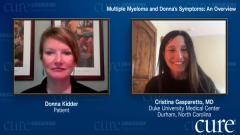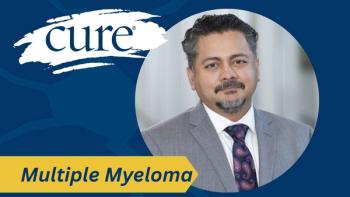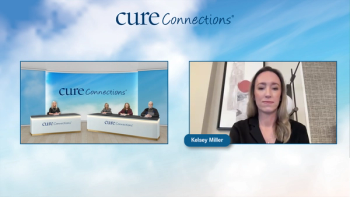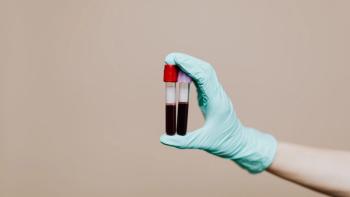
Taking Control of Multiple Myeloma
Donna and Dr Gasparetto close the discussion by highlighting the importance of physicians utilizing their patients, as well as patients being involved with their multiple myeloma treatment.
Episodes in this series

Cristina Gasparetto, MD: Sometimes we choose therapy based on the life of a patient, the expectations. I may ask you, Donna, do you prefer a more aggressive combination in the vein, but you have to come to see more often? We were talking about an allogeneic transplant, which probably is going to affect your quality of life for a while, versus a more kind of palliative combination given by mouth, not as powerful, with the intent of controlling the symptoms. I think these conversations are changing. The dialogue I’m having with the patient, with you, is different than when we first met, when you were newly diagnosed versus later on. From the patient perspective, how do you see these issues? We have a lot of options, but now your myeloma is becoming more resistant, and what is important? Controlling the myeloma? Coming to the doctor’s office, maintaining quality of life, spending more time with family, less time with us? What do you think about this?
Donna Kidder: That’s a tough question. Up until now, it’s always been about getting that time off and getting to live a normal life. I’m going to request that I get therapies that give me as much of a normal life as possible, but at the same time, keep the myeloma at bay. I think over time, based on everything I’ve learned today, that’s going to mean a little more time at the oncology center.
Cristina Gasparetto, MD: Sometimes it’s a fine line between, almost stealing away some of your life, because by the time you come to the office, have your blood checked, your infusion, maybe longer or shorter, monitoring and then recheck everything, you spend a lot of time at the doctor’s office. Where I work, we have a phenomenal team that pays attention and is available 24 hours a day for patients, but it’s not easy, right? It’s not easy. You have other things to do in your life besides spending time with us. It’s an important decision that patients may need to make.
Donna Kidder: And it’s not just the few hours in the oncology center, it’s that I’m not feeling 100% when I leave.
Cristina Gasparetto, MD: Right.
Donna Kidder: I’m not 100% for several days.
Cristina Gasparetto, MD: You mentioned earlier, you can go back and do your activity on Monday. You receive therapy on Thursday, so for few days you’re paying the price, unfortunately.
Donna Kidder: Right, even on the days I only take the dexamethasone, I’m still messed up Thursday, Friday, and Saturday, from feeling like I’ve just had 15 cups of coffee to crashing. So, it’s that.
Cristina Gasparetto, MD: I think the conversation has to be had about whatever fits for you might not be what fits for somebody else.
Donna Kidder: Absolutely.
Cristina Gasparetto, MD: Asking questions, using your physician as a resource, is important. Also be very honest with your physician about your expectations. “How do I want to spend the rest of my life, receiving chemotherapy, different combinations, versus more palliative treatment?”
Donna Kidder: Right.
Cristina Gasparetto, MD: Everybody’s different, I don’t know what I would do for myself, I agree with you. Now you are very strong, and this is what’s fits for you.
We talked earlier about some insurance ordeals and financial resources. Where I work we have a team of financial counselors, a social worker, a lot of partnerships with companies…particularly you were mentioning the copay for the oral drug; we can partner with some of the [insurance] companies.
They offer a lot of resources, support for caregivers and patients, providing even grant support for some of the copays of these drugs. Another important thing we are offering, not with COVID-19, but where I live, we have a support group once a month, led by some patients like yourself, where patients can feel comfortable to discuss their treatment, their experience. There also are a lot of big societies providing help. We had a partnership with the International Myeloma Foundation, and I offered some of these important meetings here in the area to the Multiple Myeloma Research Foundation. They do the same; a lot of reading material.
But at the end of the day, you don’t want to read everything on the internet and believe everything. You need to let us guide you. So find a physician that can guide you properly, particularly a myeloma expert who has access to clinical trials, the newer information, the resources. Also, find a support group, social support, caregivers, friends, a good network. I think those are very important pieces that we don’t stress enough. Make sure you don’t leave and spend the rest of your life just focusing on myeloma; focus on yourself. My take-home advice for today’s conversation is, like Donna, live your life, enjoy. She loves painting, flowers, gardening, running, biking, traveling, right? Your doggies.
Donna Kidder: Yes.
Cristina Gasparetto, MD: Enjoy your life. Rely on one of us, have a conversation, and be involved in the decision, what is important for your life? What type of therapy? What are your goals of the therapy? What is your last advice?
Donna Kidder: You hit on something that I haven’t mentioned. Obviously when I first discovered I had multiple myeloma and subsequently when I found out it had come back, I searched for the best provider I could find. That is the very first thing I tell someone who’s newly diagnosed with cancer. Find an expert because it makes a difference.
Cristina Gasparetto, MD: Yes, in your area, right?
Donna Kidder: Yes, find an expert in your area.
Cristina Gasparetto, MD: It’s not going to your myeloma specialist and then going to your oncologist anymore; it’s a team effort.
Donna Kidder: Exactly.
Cristina Gasparetto, MD: Absolutely; it is communication between the two physicians, because you may live two, three hours away from me and it’s not convenient for you to come and get treatment where I work. You can continue treatment, but there is communication between the oncologist and the myeloma expert and some guidance, some help. They become your oncologist, they know who you are, and then you rely on the myeloma expert to know what is coming out and other therapies. Like in your situation, the CAR [chimeric antigen receptor]-T cell therapy on a clinical trial, then the selinexor, carfilzomib as part of the clinical trial were very important steps.
Donna Kidder: Yes.
Cristina Gasparetto, MD: You’re absolutely right, have at least a conversation with the transplant specialist and talk about the immunotherapy and these new agents. That’s my advice too.
Well, I think it was a phenomenal discussion. I’m so glad that you could be here with me today, and hopefully it will be helpful for patients and caregivers going through this journey together. One last message, think about the communication with the physician and the reliability. I know that you read a lot, and you are super smart, but sometimes you have to rely on our recommendation too. We can make the decision together. I have spent half of my life learning about the disease and approaching the disease, so we know what’s going on with that. It’s very important to maintain communication with your physician, with your team.
Donna Kidder: Yes.
Cristina Gasparetto, MD: Thank you so much, Donna.
Donna Kidder: Thank you.
This transcript has been edited for clarity.




